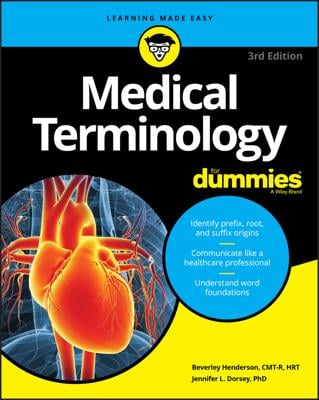Time for some medical terminology fun! The glands of the endocrine system all produce different hormones that help keep the systems of the body running like clockwork. If you consider these glands the gatekeepers of the hormones they produce and send, you can consider prefixes and suffixes the gatekeepers of the root words. They both help tell you more about the meaning of the medical term.
Here are some prefixes and suffixes associated with the endocrine system:
| Prefix | What It Means |
|---|---|
| Eu- | Normal |
| Ex-, exo- | Outside, outward |
| Hyper - | Excessive, above normal |
| Hypo- | Below normal |
| Pan- | All |
| Suffix | What It Means |
| -drome | Run, running |
| -emia | Blood condition |
| -genesis | Production |
| -ism | Condition |
| -tropin | Stimulating the function of |
Next, check out the nitty-gritty of endocrine terminology. As always, the root words and combining forms let you know more about the condition or location involved with each term.
| Suffix | What It Means |
|---|---|
| Acr/o | Extremities, height |
| Aden/o | Gland |
| Adren/o | Adrenal glands |
| Andr/o | Male |
| Calc/o | Calcium |
| Cortic/o | Cortex |
| Crin/o | To secrete |
| Dips/o | Thirst |
| Estr/o | Female |
| Galact/o | Milk |
| Gluc/o, glyc/o | Sugar |
| Gonad/o | Sex glands |
| Home/o | Sameness or unchanged |
| Immun/o | Safe |
| Kal/i | Potassium |
| Lact/o | Milk |
| Natr/o | Sodium |
| Pancreat/o | Pancreas |
| Parathyroid/o | Parathyroid gland |
| Pituitar/o | Pituitary gland |
| Radi/o | Radioactive |
| Somat/o | Body |
| Thyr/o thyroid/o | Thyroid gland |
| Toxic/o | Poison |
| Ur/o | Urine |
It is, without a doubt, incredibly vital that the components of the endocrine system work in harmony because the system is a fairly complex collection of glands that produce a variety of hormones. The specialty study of this system of glands is known as endocrinology, with the physician in charge known as an endocrinologist.
Here’s a closer look at even more aspects of this highly influential system. First, take a look at some hormone-related terms:
Adrenalin/epinephrine: Adrenalin is a traditional trademark for the preparation of epinephrine (adrenaline) in the United States
Antidiuretic hormone (ADH): Hormone secreted to stimulate water reabsorption
Cortisol: Hormone secreted by adrenal cortex
Epinephrine: Hormone produced by adrenal medulla
Glucagon: Hormone produced by pancreas in islets of Langerhans that stimulates the release of sugar
Growth hormones (GH and hGH): Secreted hormones stimulating the growth of long bones; also called somatotropin
Hydrocortisone: Cortisol
Insulin: Hormone secreted by islets of Langerhans; essential for the proper uptake and metabolism of sugar in cells
Islets of Langerhans: Endocrine cells of the pancreas
Melatonin: Hormone secreted by pineal gland
Oxytocin: Hormone secreted to stimulate uterus to contract during labor
Renin: Hormone secreted by kidneys to raise blood pressure
Somatotropin: Growth hormone
Steroids: Complex substance derived from cholesterol of which many hormones are made
Target tissue: Cells toward which the effects of the hormone are directed
TSH: Hormone secretion that stimulates the thyroid gland to produce thyroxine (T3) and triiodothyronine (T4)
Vasopressin: Antidiuretic hormone ADH
Next, take a look at some of the other substances associated with the endocrine system. Though not hormones, these are vital products of this system, and help keep the body functioning properly.
Calcium: Mineral substance necessary for proper functioning of body tissues and bones
Electrolytes: Mineral salt found in blood and tissues; necessary for proper functioning of body cells; potassium, sodium, and calcium are examples of necessary electrolytes
Glucose: Simple sugar
Glycogen: Starch, a storage form of sugar
Iodine: Chemical element composing a large part of thyroxine, produced by the thyroid gland
Protein comes from the Greek protos, meaning “first.”

